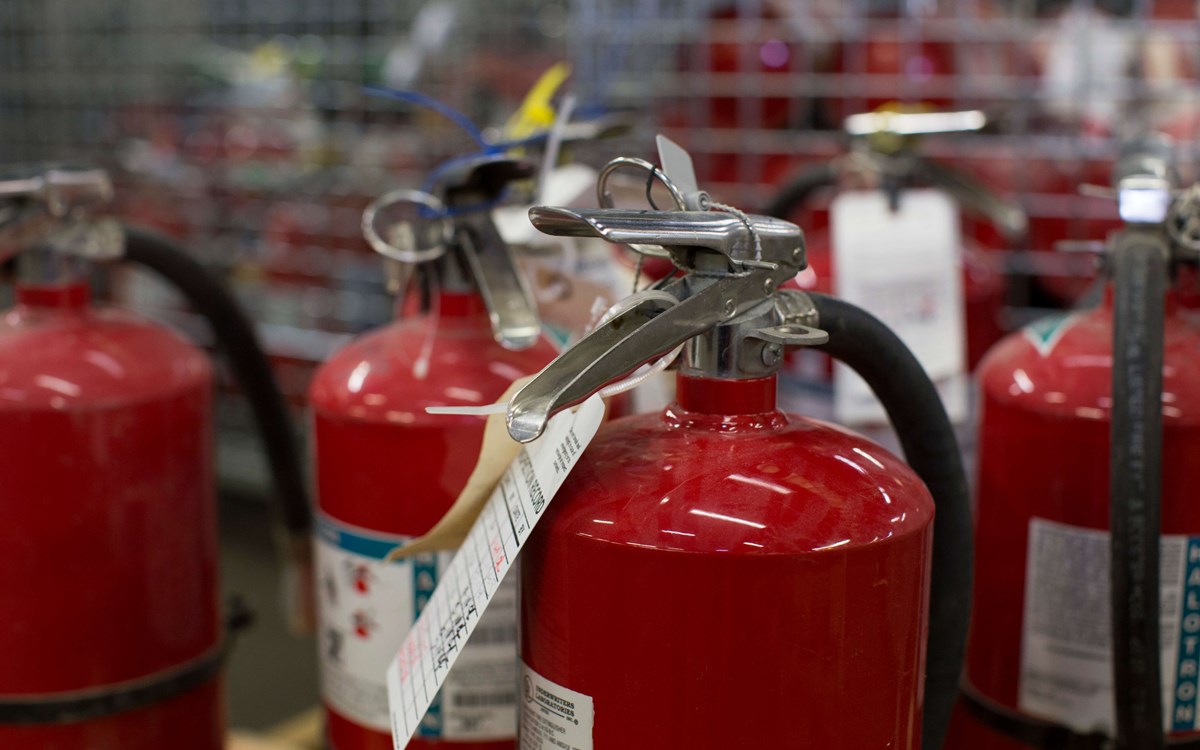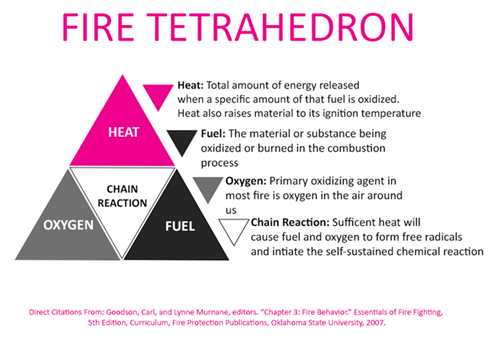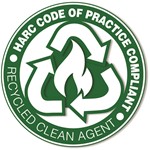FAQs Clean Agent Fire Protection & Halon
Whatever you need to know about Halon, we can help. Take a look at our frequently asked questions below. If you can’t find the information you are looking for, contact the A-Gas team.

Clean agents are non-corrosive, electrically non-conductive, safe for occupied spaces, and do not leave behind a residue. They are most often used in systems that protect irreplaceable or high-value products such as data centers, museums, power plants, aviation and aerospace, etc.
Halon is a clean agent fire suppressant found in both fire suppression systems (Halon 1301) and handheld fire extinguishers (Halon 1211). They are the first clean agents to be developed and are the most effective of all the clean agents available today.
No! The Montreal Protocol, which came into force in 1989, requires a phasedown. Since 1994 in developed countries, it also mandates a production ban on all ozone depleting substances, including Halons; developing nations (Article 5 parties) ended production in 2010. Halons are not restricted from critical uses, as re-use of these ozone depleting chemicals reduces their emissions rate. Globally, the Montreal Protocol has been effective in reducing these emissions and is enabling the trend of a return to healthy levels of stratospheric ozone.
Halon is still used in many applications. From protecting computer rooms throughout the electronics industry to numerous military applications on ships and even on commercial aircraft, Halon is an integral and unparalleled fire-extinguishing agent. Halon 1211 fire extinguishers play a vital role in protecting peoples’ lives and their property, including homes, automobiles, and boats.
Contrary to popular belief, Halon does not remove oxygen from the air but rather it reacts with all elements of a fire. When Halon is discharged, it breaks the chemical chain reaction. This accounts for most of its fire-fighting properties. The other properties come from the cooling effect of the expanding gas. Because of this, Halon is uniquely effective as a clean agent fire suppressant.

Current replacements for Halon 1211 are HFC-236fa and Halotron® 1. View the complete list of Streaming Agents on the US EPA's website.
Replacements for Halon 1301 are HFC-227ea, HFC-125, and NovecTM 1230/FK-5-1-12.
Read updates on our News & Insights page! Our Fire Protection team regularly attends and presents at industry events, including the NFPA Conference & Expo, NAFED’s Conferences & Expos, and state-level industry association events, just to name a few. If you’d like to be notified when our team will be presenting at or attending an event, sign up for email alerts.
We have the following storage containers available for Halon 1211, Halon 1301, HFC-236fa, HFC-227ea, HFC-125, and Halotron® 1:
- 50 lb.
- 100 lb.
- 150 lb.
- 200 lb.
- 300 lb.
- 500 lb.
- 1000 lb.
- 1 ton (2000 lb.)
HRC Voluntary Code of Practice is a code of ethical practice for reclaimers of Halon. This Code of Practice has been developed to assure users and the public that HRC Enrolled Sellers engaged in the business of reclaiming and recovering Halon are operating in a manner that promotes safe and environmentally responsible Halon reclamation. View the HRC Code of Practice here.
Laboratory certifications are proof that an agent has been tested and approved for passing the industry-accepted standards (i.e. ISO-7201 or ASTM-D5632, Type I or Type II). It is standard practice that every cylinder or bulk tank of agent supplied by A-Gas has a laboratory certification.
A-Gas established a comprehensive Halocarbon Management Program in response to our customer’s environmental and fire protection needs. We purchase, then process and sell reclaimed halocarbons, meeting or exceeding all industry standards. We only sell to “critical users” and strictly follow all regulations and laws regarding the safe handling and transportation of halogenated agents.
A-Gas can also help you dispose of your Halon. Occasionally, owners of ozone-depleting chemicals may select destruction as a preferable option, especially if their corporate policies require permanent disposal of all ODS (Ozone Depleting Substances), Class 1 CFCs, and Halons. A-Gas stands ready to accept these unwanted agents for destruction via the A-Gas PyroPlas®, the market-leading solution for the destruction of used fluorocarbon gases and other waste streams. Our PyroPlas, located in Bowling Green, Ohio, is United Nations-approved, TEAP-certified. A-Gas PyroPlas delivers the industry’s highest guaranteed destruction efficiency (99.9999%).
A-Gas can assist sellers wishing to dispose of Halon in an environmentally friendly manner, as well as assist buyers with “critical needs” who require Halons 1211 and 1301 for recharging their existing systems.
Reclaimed Halons are cleaned by means of filtration, distillation, separation, or other mechanical processes. As a result, our reclaimed products meet the standards as set forth in ISO 7201 or ASTM D5632, Type I or Type II. Reclaimed products are different from recycled products because recycled products only have basic contaminants, like oils and moisture, removed. Reclaimed products are fully cleaned and brought back to a specified standard of performance.
A-Gas operates a comprehensive Halocarbon Bank Management Program which meets all requirements of the EPA’s 1990 Clean Air Act, as well as, the HARC Recycling Code of Practice.
Absolutely you can buy used Halon. But when you buy a system container of Halon that has not been reclaimed and/or laboratory tested, you cannot know for certain what it contains or if it will perform as you intend. A-Gas takes great pride in selling only reclaimed and laboratory-certified products. Always demand laboratory certifications for each tank and/or cylinder containing Halon. Visit NFPA for guidelines for refilling Halon.
A-Gas does not sell fire suppression systems, but we do sell the gases which go inside these systems, as well as the service to refill the tanks. Agents like HFC-227ea, HFC-125, NOVEC™ 1230/FK-5-1-12, and Halon 1301.
Yes, A-Gas offers Halon recharges and is available 24/7, 365 days a year.
We can supply the gases to refill extinguishers, as well as decant any extinguisher. Unfortunately, we do not provide filling services for hand-portable Halon fire extinguishers at this time.
You can read the Fire Suppressant Recycling Under the HFC Allocation Program Fact Sheet for more detailed information, including a helpful FAQ section to help you to determine if you qualify as a fire suppressant recycler.
The Fact Sheet states: “Generally, an entity that collects used HFC fire suppressants and directly resells those collected and aggregated HFCs—with or without any additional reprocessing—to another entity for reuse as a fire suppressant would qualify as a fire suppressant recycler... An entity that collects and aggregates used HFC fire suppressants for distribution to another entity for reprocessing before being sold for reuse as a fire suppressant would not be a fire suppressant recycler. Similarly, an entity reselling HFC fire suppressants that have already been reprocessed for use as a fire suppressant by another entity would not be a fire suppressant recycler.”
